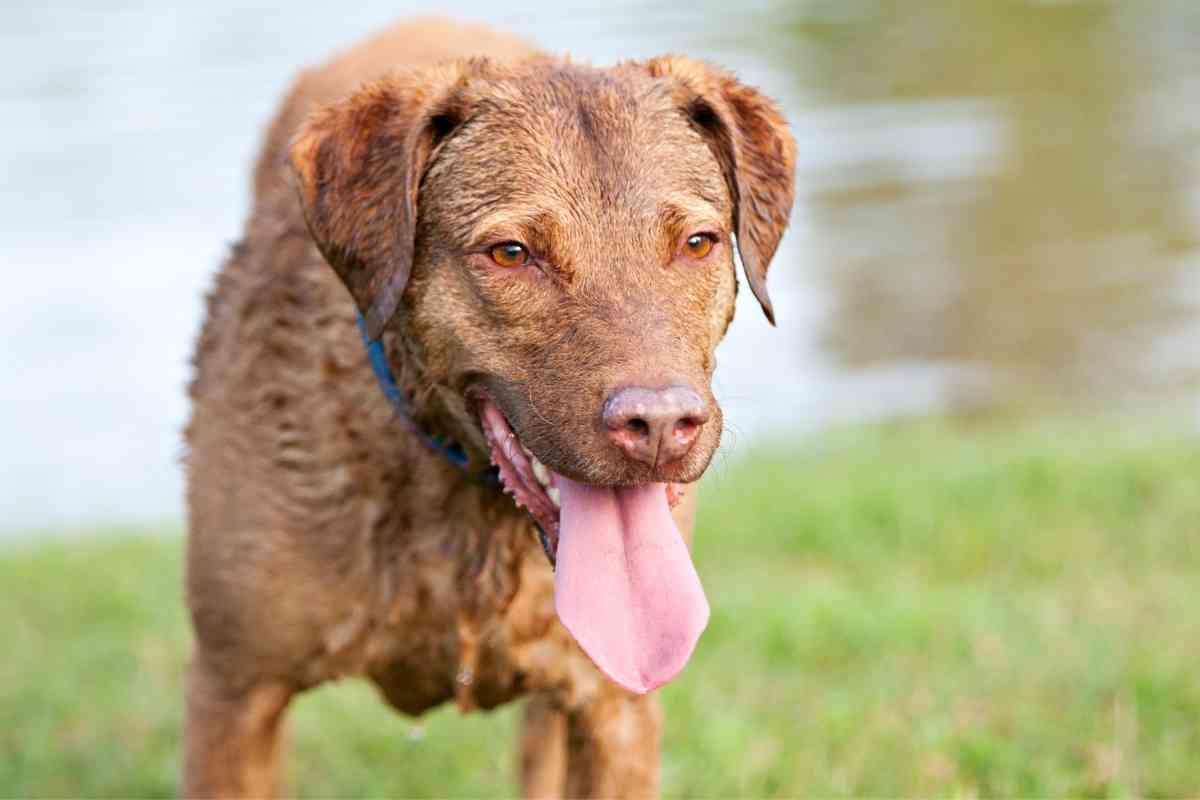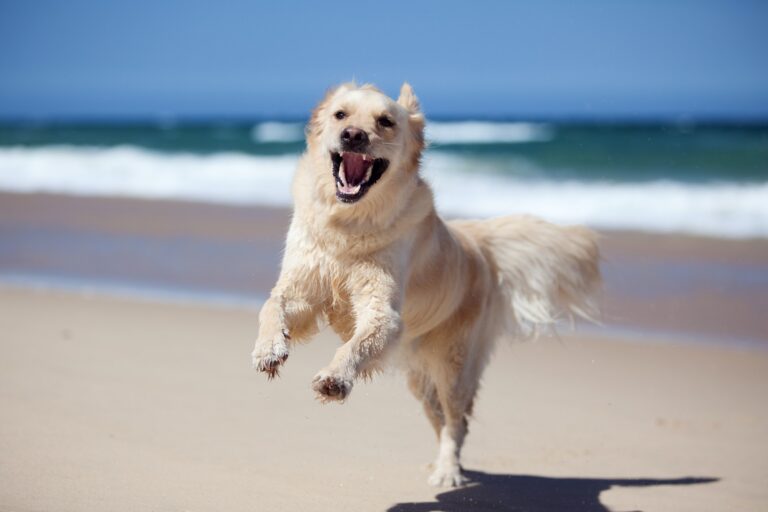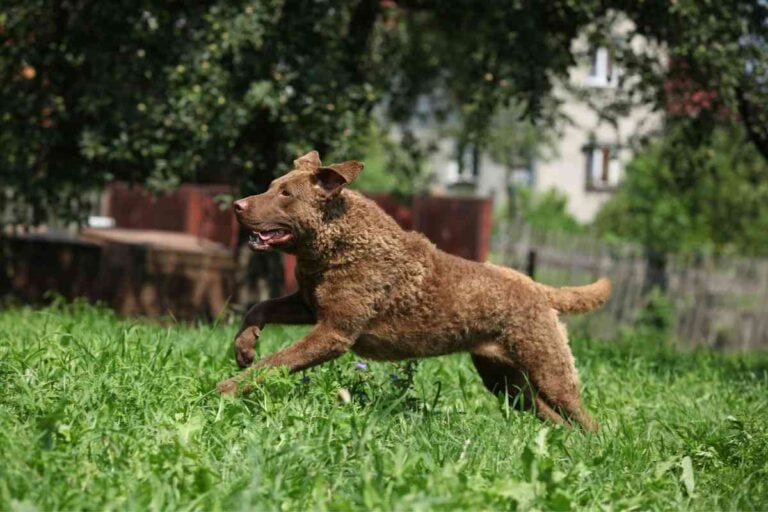Are Chesapeake Retrievers Aggressive?
Knowing whether your dog might be aggressive or not is important because you will want to take proper protocols to make sure they always act well around strangers and people that come into the house.
Having an aggressive dog makes it harder to welcome people into your home and it can also be hard to trust them around young children.
While most retriever breeds are not known for being aggressive, you might be wondering about the Chesapeake Bay Retriever.
Are Chesapeake Retrievers Aggressive?
Chesapeake Bay Retrievers tend to be more suspicious and reserved when it comes to strangers and new people in the house. They also make good watchdogs since they tend to be more vocal and they will want to alert you when there are people in the house. Despite these protective qualities, they are not usually aggressive.
If you just bought a Chessie you are thinking about buying one, you might be wondering if they are aggressive and how you can prevent them from being aggressive towards you and others.
While they are not known to be aggressive, it’s always a good idea to know how you might need to train them and handle them properly when they are around strangers.
How Aggressive are Chesapeake Bay Retrievers?
Chessies are not as friendly and happy to see new people as other retriever breeds.
Despite them not being overly friendly though, they are usually not aggressive towards other people in the house or towards strangers who come to visit you.
They might be aggressive towards other dogs though if they are not used to be around other pets or if they grew up alone.
Chessies might bark when someone new comes to the house, but they will not bark excessively.
Chessies are not overly excitable, and they are pretty even tempered when it comes to being around you and new people.
They might be more likely to ignore new people in the house rather than greet them and jump on them like retriever breeds do.
Some people who own Chessies say that they can be strong-willed though and you might need to do extra training with them to show them not to be suspicious of guests.
Obedience training is often recommended and required for Chessies since they tend to be pretty dominant, and they will want to be the leader of the house unless you show them that you are the leader instead.
Are Chessies Protective?
Yes, Chesapeake Bay Retrievers are protective by nature, and it will be hard to get them to act otherwise.
Chessies are also known to be sensitive to their owner’s needs, which means they follow you around or try to be around you more often if you are feeling sad or stressed.
While most dog owners enjoy the company of the dog, some might find it annoying when they are trying to work or if the dog is constantly around your feet.
There isn’t much you can do about the Chessie protective since it’s just in their nature.
In rare cases, being overprotective can turn into aggression.
This is often more common if you are the sole owner of a Chessie rather than it being a family dog.
The Chessie might be used to being around you alone and they might become territorial if all of a sudden there are other people around you many other people in the house.
Chessies tend to be much more loyal to their family than other retriever breeds and this is why they are suspicious of strangers in the house.
Chessies never go looking for trouble so they will not cause you issues if you are just around other people or if you are outside taking them for a walk.
You might notice your Chessie always watching or listening you might just see them perk up when they hear a noise or when someone new comes into the room.
Are Chessies Hard to Train?

Chessies are not hard to train as they are very similar to Labradors and Golden Retrievers which are all easy breeds to train.
They are also even tempered and they like to have jobs to do.
This means they like to master new skills and they will enjoy spending time with you as you learn new tricks together.
They are also dependable and hard working which makes them even easier to train.
Your mindset also matters when you are training the dog.
Chessies are very self assertive and they can be bossy when it comes to training them.
You need to make sure you are showing them that you are the master and that you expect them to listen to you.
Chessies are even easier to train if you get them when they are puppies as they do not have their own habits yet and they will be more likely to listen to you and they will want to please you.
You also need to show that you are confident and that you know what you are doing, even when you don’t.
If you aren’t sure you can train the Chessie yourself, you can always get a professional trainer to work with you and to help you know the right commands and tricks.
Why is My Chessie Aggressive?
Although we discussed that Chessies are not aggressive in nature, there are some cases where they can get aggressive.
Sometimes a Chessie that has suddenly become aggressive can be a sign of a medical issue.
Chessies might even suffer from episodes of rage if they have certain health conditions which can make them unsafe to be around children and elderly people.
Most of the time, a highly aggressive Chessie that used to be calm might be suffering from seizures or other neurological problems.
If your Chessie has always been aggressive, this could be just their personality or it could be that you don’t show enough leadership and confidence within the house.
Chessies that feel like they are the dominant member of the family are more likely to be aggressive or have other behavioral problems.
If you think your Chessie might be suffering from a health condition or a neurological problem, you might want to see if you can put them on anticonvulsants. A vet will be able to an EEG and see if they have abnormal brain waves.
If they do, they can prescribe the medicine to help your Chessie.
Most owners see a huge difference once the dog has been put on medication and they can live peacefully with their Chessies again.
Seizures and other problems in the brain that cause aggression are thought to be hereditary and inherited from the parents.
If you are getting your dog from a vet or breeder, you can ask them if any of their dogs have a history of neurological problems.
This might be able to help you better plan for aggression or rage episodes should they happen in the future.
Chessies that show rage problems almost always have a health condition rather than a temperament disorder.
This means you can treat them and they will not have to live like this forever.
Putting your dog on medication and taking them to the vet will make everyone more comfortable, so don’t be afraid to take them to the vet and see if they can get treatment.
Why Does My Chessie Act Aggressive Sometimes?
Many times, owners of Chessies can mistake the signs of aggression for the dog just being dominant or even having anxiety.
If you leave your dog alone for longer periods of time or you come home to them barking and having chewed up things, this is often a sign of them being bored and lonely rather than being aggressive.
Chessies also do not like to be alone, but they also do not like to cuddle too often. Even though your Chessie is not cuddling with you and showing affection, this is not a sign of anger or not wanting to be with you. They just prefer their alone space and would rather have some time to themselves.
Some Chessie owners also think their dog is being aggressive then they are really just being dominant. Chessies might not want to listen you sometimes or they might show that they want to be independent and do things themselves.
The good news is that dominant dogs can often be trained and their habits can be broken. Starting from a young age is always easier than when the dog is already older and set in their ways.
Final Thoughts
Chessies are not naturally aggressive, but they can be dominant. If you spend time with them training them though and you show that you are confident and assertive, they will not be dominant or bossy around you. Having the right amount of assertiveness is key.
The only reason your Chessie might become aggressive later in life is if they develop a health issue. If you notice a suffer onset of aggression, always take the dog to the vet and seek professional advice on care and treatment.






